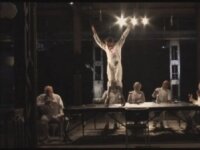Video Festival Dedicated to World Theater Day
04 April, 2013
 On March 27, 28 and 29, on the initiative and organization of Ilia State University Art Scientific Research Center, theater video festival was held at Tumanishvili Film Actors Theatre to mark the World Theatre Day. The festival T+V was launched in 1997, on the initiative of Caucasian International Foundation.
On March 27, 28 and 29, on the initiative and organization of Ilia State University Art Scientific Research Center, theater video festival was held at Tumanishvili Film Actors Theatre to mark the World Theatre Day. The festival T+V was launched in 1997, on the initiative of Caucasian International Foundation.During the years, the retrospective of the worldly known theatre performances as well as cognitive and educative meetings, master-classes and workshops led by the famous theatre theoreticians and practitioners have been conducted.
The video festival T+V was opened this year with the words of congratulation by Dario Fo, Italian dramatist, director, actor, Nobel Prize laureate. His words were symbolically read in Georgian by Zurab Getsadze, Director of Tumanishvili Film Actors Theatre. “A long time ago, when the central authorities did not subordinate the Comedia Del Arte actors, they were exiled from the country. Today a lot of actors find it extremely difficult to find a public space, theatre and spectators as we are facing a common crisis. The central authorities do not take pains in controlling them. They try to express themselves via irony and sarcasm. They have neither a rostrum nor the audience to appeal to it. It used to be extremely difficult to stop comedians in the epoch of Renaissance, as the big audience would listen to them with great pleasure. A vast expel of the Comedia Del Arte actors occurred in the era of counter-reformation, when a decree about abolishing the theatres was released. It was particularly the case in Rome, as the authorities in charge of Italy blamed actors for insulting the sacred city. In 1697, on the persistent demand of the conservative wing of the Bourgeoisie and the clergy, Pope Innocentius XII ordered to demolish the Tordinona Theater, which according to the moralists was offering immoral plays to the audience. During the counter-reformation era the cardinal Carlo Boronio, who worked in the Northern part of Italy, separated art – supreme form of spiritual upbringing and theatre – manifestation of obscenity and ambition. In the letter, addressed to his co-thinksers, he wrote: “We did our best to eradicate the wickedness. We even burnt the obscene texts in order to eliminate them from people’s memory for once and forever. We arrested everybody, who had participated in printing and spreading those texts. However, Satan does not sleep and he found a more cunning way: something seen with man’s eyes is much more impressive than read in books. The gestures and words are more harmful for young people’s minds. Therefore, we should get rid of the theatre workers as of the evil spirits. If we do not forget all of these, the only way to overcome the crisis is a hope that Great Expel was done against all the youth who wish to learn the theatre art. The new Diasporas of comedians, theatre founders will find new forms of expression, and will do much more as a response to this oppression.”
The festival presented “Hamlet” in an experimental space, “Paganini” - full of humorous elements, “Kalas”, “Frankenstein”, “King Lear” and other plays from different countries.





















































